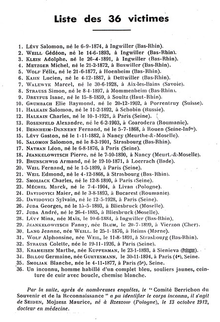The tragedy of the Guerry's wells designates the massacre of 36 Jews during the summer of 1944 in Savigny-en-Septaine in France. It is located at 47°02′07″N 02°31′26″E / 47.03528°N 2.52389°E.[1]


History edit
On July 21, 1944, men from the French milice led by Joseph Lécussan, and the Gestapo arrested 70 Jewish refugees.[where?] Most of them were from Alsace-Lorraine, but had managed to hide in Saint-Amand-Montrond and its surroundings since autumn of 1939. They lived there for five years in relative safety. On a farm, 36 persons were thrown in three different wells along with some stones in order to crush them alive. The victims were men and women aged from 16 to 85.[2]
Only one man, Charles Krameisen,[3] managed to survive and to crawl back alive from the well. After the Liberation, his testimony allowed the site of the massacre and the bodies of the victims to be found, on October 18, 1944.
The event can be seen as an example among hundreds which bear witness to the atrocity of the Jewish genocide undertaken by the Nazis in France with the help of French militias.[4][5]
One of those responsible for the massacre was Pierre Paoli, a French agent of the SD of Bourges, acting under the orders of Friedrich Merdsche; he was condemned to death and executed in 1946.[6]
Commemoration edit
In 1992, a monument to commemorate the atrocity was made by Georges Jeanclos, who himself had hidden for one year in a forest to escape the Gestapo. His uncle Pierre Jeankelowitsch (number 18) and aunt Fanny Jeankelowitsch (number 29 on the list) were amongst the victims of the tragedy of Guerry.[7]
In 2013, tributes to the victims were held with a commemoration.[8][9]
References edit
- ^ FICHE 20. Les Puits de Guerry, DREAL Centre-Val de Loire
- ^ "People mourning for the tragedy of Guerry's wells".
- ^ "Review of Todorov, Tzvetan, A French Tragedy: Scenes of Civil War, Summer 1944". July 1997.
- ^ Amélineau, Stéphane (2017-06-01). La Shoah en Soissonnais: Journal de bord d'un itinéraire de mémoire (in French). Iggybook. ISBN 9782304046892. Retrieved 2018-09-29.
- ^ "La tragédie des puits de Guerry | Le comité Français pour Yad Vashem". yadvashem-france.org (in French). Retrieved 2018-09-29.
- ^ Trompe-la-mort: Les cahiers secrets de Pierre Paoli, agent français de la Gestapo de Jacques Gimard-.php
- ^ "The Guerry Columns by Georges Jeanclos". Musée d'Art et d'Histoire du Judaïsme. 2020-04-11. Retrieved 2022-01-19.
- ^ "Le massacre de 1944 aux puits de Guerry sera commémoré le mercredi 24 juillet". leberry.fr (in French). 2013-07-19. Retrieved 2020-07-10.
- ^ "Exposition temporaire au CDI : un épisode de la Shoah – la tragédie de Guerry. Le lycée Adrien Zeller – Bouxwiller". lycee-zeller-bouxwiller.fr (in French). Archived from the original on 2018-09-29. Retrieved 2018-09-29.